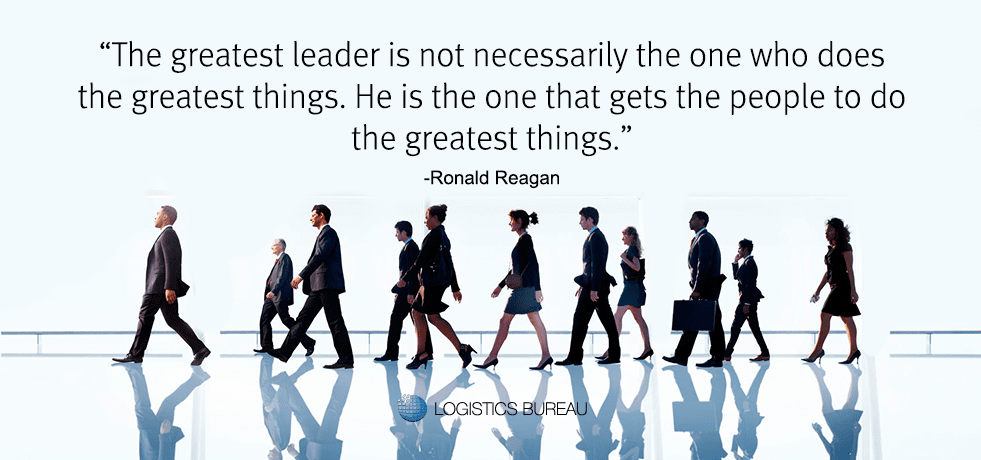What are the essential skills you need to possess or develop if you want to become one of tomorrow’s supply chain leaders? Is it enough to have a business-related degree and a little supply chain experience, or is supply chain leadership a vocation for which you must work hard to acquire specific qualities?
In reality, it’s probably a little bit of both. Indeed, many elements of supply chain leadership can’t effectively be learned through academic channels alone.
In any case, an excellent place to start is by knowing what the most vital supply chain leaders’ skills are and, of course, why you need them.
That’s what you’ll find in this article, so you can check which essential skills you already have, and which ones you might wish to enhance with some pragmatic supply chain education.

These Are the 7 Supply Chain Leaders’ Skills You’ll Really Need
1. Information Technology and Automation Knowledge
Before getting into this first section properly, I want to make one essential point, which I’ll expand on later in this article. Supply chain leadership is all about people using technology as a tool. Nothing is more important than working on your people skills if you want to be a successful supply chain leader.
Nevertheless, few supply chains run successfully today without the support of sophisticated technology tools, like warehouse management and enterprise resource planning (ERP) systems. For that reason, you need at least a modicum of IT understanding to work in a supply chain environment, particularly if you intend to hold a leadership position.
To be a supply chain leader, you will need to be familiar with the use of enterprise software applications like WMS, TMS, and ERP, not to mention analytics software, which is increasingly becoming a staple source of leadership decision support.
Enterprise IT Skills at User-level
There was a time when supply chain leaders could rely on subordinate employees to do all the hands-on work with business information systems, and be content to receive reports and Excel spreadsheets containing data for decision-making.
Those days are gone, however. Today you’re expected to find your way around the modules of your company’s ERP and business intelligence applications on your own. Furthermore, your need for technological understanding extends beyond hands-on use.
Understand IT as a Buyer
As a supply chain leader, your input into IT procurement will be crucial, and you must know enough about your company’s technology needs to discuss them with vendors. You’ll need to understand the relationship between ERP workflows and physical processes, for instance, to help prevent classic mistakes from being made, such as applying new technology to outdated, inefficient processes.

It will help if you know automation technology, too, since more and more companies are applying automation in distribution centres and warehouses.
Ultimately, strong interpersonal skills still trump technological expertise as a supply chain leader’s forte. However, a career at the head of your company’s supply chain is not one to consider if you don’t have some affinity for technology and its application in business.
If you’re a member of our online supply chain education program, Supply Chain Secrets, you can easily access some of the knowledge you need to understand IT as a buyer.
The program includes eclasses on several types of software platform including enterprise resource planning (ERP), warehouse management systems (WMS), and transportation management systems (TMS).
2. A Grasp of Economics and Market Dynamics
The supply chain world is changing rapidly and sometimes unpredictably, in line with the market dynamics across many industries, all of which are being affected by rapid shifts in customer and consumer buying-behaviour.
Many markets that used to be purely local or regional have become global, as have the supply chains that serve them. As a supply chain leader, you will need to focus on what lies ahead and, to some extent, predict it. That can only be possible with a thorough understanding of the market dynamics relating to your industry and your company.
Of course, each industry and the niches within them are subject to unique and specific market dynamics. Supply chain leaders can work in any industry as long as they know their stuff, but this does mean that a change of employer can require some in-depth study, especially if the market is unfamiliar.

As a basis to quickly adjust to supply chain career moves, it will help a lot to be familiar with economics’ basic concepts.
To see ahead and lead a supply chain team effectively, you’ll need to understand what drives demand, supply, and pricing for the goods and services provided by your organisation and its competitors. These forces impact a variety of supply chain management elements, including the cost of goods sold and the cost to serve your company’s customers.
3. Understanding Cost-to-serve
Supply chain leaders play a very active role in the profitability of their employing companies. If you’re running a supply chain operation, your decisions impact the costs involved in supplying your organisation’s customers.
You will have a huge advantage and the potential to shine as a leader if you can quantify how your supply chain leadership decisions affect your bottom line. For instance, too few companies focus on the real costs involved with serving customers.
The result of this inattention is often a one-size-fits-all approach to service, inevitably leading to the over-servicing of some customers and the under-servicing of others. A single service offering can even impair profitability, perhaps creating a situation where logistics costs cause some sales to generate losses instead of profits.

If you understand the cost-to-serve concept and can apply it to your company’s supply chain activity, you’ll be able to identify unprofitable customers and products.
By developing a thorough cost-to-serve understanding, you’ll even be able to make decisions that improve the profitability of those customers and products instead of taking knee-jerk measures to cut losses.
Every company wants supply chain leaders who can make direct and positive impacts on the bottom line—but not every company has such leaders. That’s why familiarity with cost-to-serve is one skill that can help you stand out as a competent supply chain professional.
4. The Skill of Flexibility
The one thing you won’t find on this list of supply chain leaders’ “must-have” skills is innovation. You don’t have to be an innovator to be an outstanding supply chain leader, but you do have to support and drive innovation. Flexibility is the skill that will help you to do that.
Flexibility gives you the ability to let others engage in the innovative thinking. Your flexibility will give those creative thinkers the confidence to present their ideas, since they know that you will adopt them if it makes sense to do so.
Flexibility will keep you from feeling too comfortable in the status quo ever to let it go. Flexibility will ensure that change (often termed the only constant in supply chain management) will not faze you or cause you undue stress. In turn, your team will be encouraged to embrace, rather than resist, change.
Flexibility is one of the soft skills that differentiate successful supply chain leaders. That’s not only because of the changing nature of supply chain operations, but also because things don’t always go to plan—far from it if truth be told.
For example, during supply chain improvement projects, it’s not uncommon for things to crop up, requiring plans to be changed. An inflexible leader may doggedly try to drive through with the original strategy, becoming ever more frustrated in the process and hampering, rather than helping the situation.

Inflexibility often manifests in the belief that changing a plan is an admission of poor planning, but in many cases, that is an erroneous presumption.
Don’t fall into this trap. Work on your flexibility as a leader. Accept that plans should always be work-in-progress, and adapt your approach when required. You can’t plan for every eventuality, and while flexibility is a virtue for supply chain leaders in general, it’s absolutely essential in project management.
5. Project Management Skills
Aside from flexibility, there are many other project-management skills that you’ll need as a supply chain leader. Of course, a lot depends on what leadership role you are in, but if you are headed to the top, you’ll probably hold several management positions on the way up, most of which will see you leading projects from time to time.

If you make it to the C-suite or, indeed, to any senior leadership position, it will help you and your managers do a better job if you understand the fundamental principles, pitfalls, and challenges inherent in project management.
The most crucial project management skills to acquire as a supply chain leader are as follows:
- The ability to negotiate successfully for resources, budgets, and schedules
- A high degree of personal organisation
- A proactive approach to risk management
Of course, the above-noted skills are also valuable for supply chain leaders generally, not just as part of a project-management skill set. I’ve simply noted them here because they are the carry-over skills most likely required in a supply chain leadership role. To elaborate:
- Personal organisation will be vital for keeping track of numerous projects for which you are likely to be a sponsor and meeting your obligations toward them.
- You may sometimes be called upon to support project business cases, hence the need for negotiation skills.
- When deciding if you’ll approve a requested project, knowledge of risk management will help you ask the right questions about the proposal and business case.
6. The Ability to Get the Best from People
So how about those people skills I briefly mentioned earlier?

I can’t put it any more plainly: the ability to lead, manage, influence, and inspire other people is the number one fundamental, essential skill that all supply chain leaders and managers should possess.
It is entirely possible to learn the necessary skills, but a word of caution is due. If you don’t enjoy team building and developing professional relationships with lots—and I do mean lots—of other people, don’t choose a supply chain leadership career.
On the other hand, if you love working with people but just don’t see yourself as a great leader, you probably have exactly the right mindset to succeed in a supply chain leader’s role.
There is nothing wrong with being self-critical, as long as you have the will to learn what you need to learn, and the energy to commit to your personal development. Being passionate about teamwork and enjoying interactions with others is half the battle in succeeding as a supply chain leader.
While you will find some of the softer skills outlined below, a much more comprehensive introduction can be attained through subscription to Supply Chain Secrets.
Many of the program’s eclasses, and some of the chapters in the books (available free to SCS members) focus on leadership and people-management skills and disciplines.
The 3 Cs of Supply Chain Leadership
Communication: First and foremost, you need to communicate well … to articulate sometimes complex concepts in a way that anyone within your company can understand, regardless of whether they have supply chain knowledge or not.
Depending on whether your company operates internationally, you might benefit from communication skills that extend beyond your native language. It’s becoming ever more common for enterprises to give preference to bilingual or multilingual leadership candidates.
Collaboration: Secondly, you will need to be able to foster collaboration, a critical element in any modern supply chain.
It won’t always be easy, because sometimes you’ll be asking teams inside and outside of your business to collaborate and work together despite competing priorities and expectations. To ensure these parties collaborate, you’ll need to draw on communication, persuasion, and relationship building skills.
Change: Change management is another people skill in which you might wish to receive some special education or training. If you are planning to graduate from a role where you’ve been used to participating in, but not leading change efforts, experience alone may not be sufficient to help you take people through challenging changes. Resistance to change can be hard to overcome.
The impact of changes within your supply chain can affect employees on a very personal level. You’ll need to know how to empathise and to listen actively to what people are telling you. Without these skills, your leadership can quickly be rejected during periods of change, purely through fear of the unknown and a sense that you don’t appreciate employees’ concerns.
Get the Best From Yourself
Finally, while the need to interact effectively with other people might seem obvious, you shouldn’t neglect the development of the person most impacted by your skills and abilities—yourself.
Supply chain leaders should be able to conduct regular self-assessments and identify their areas of weakness.
We never stop learning and developing, but by having the ability to self-appraise your skills honestly, and work on those areas that need it, you can acquire new expertise at a rate that keeps pace with the ever-changing supply chain environment.
Getting the best from yourself also means having the ability to curb your ego. Learn to recognize when somebody else in your team exceeds your aptitude for a specific task or responsibility.
Let that individual take the lead, and be happy to follow and learn from her. Not only will that free you to play a part in which you can use your strengths, but you’ll also be empowering the other person and helping her to reach outside of her comfort zone.
7. The Know-How to Negotiate
As a modern supply chain leader, it won’t only be your reports and colleagues that you need to interact with effectively and skillfully, but also those outside your organization. Moreover, both internal and external interactions will often involve the need to negotiate.
Supply chain leaders must negotiate often, and even if you’re not doing so on a one-to-one basis, you’ll probably find yourself in scenarios where you’re part of a team of people trying to broker a deal or arrangement.
Negotiation Scenarios for Supply Chain Leaders
Some examples of possible negotiation situations that you might get involved in, and in many cases, lead, include:
- Procurement of IT services and solutions
- Contracts for logistics services
- Brokering deals with product vendors (for direct or indirect supplies)
- Putting together contracts or service level agreements with customers
- Negotiations with employee groups or trade unions
- Business merger/acquisition negotiations
Why do Negotiation Skills Matter?
Negotiations are typically transactional, but often take place between entities or teams engaged in long-term business relationships. Whether you are the lead or a mere participant in the negotiation, your skills will influence the transaction’s outcome and the trajectory of the broader relationship.
It’s easy to make mistakes during negotiations, but with relevant training and education, you can hone your skills to avoid some of the most common errors.
For example, skilled negotiators know that the process does not have winners or losers. They don’t go into a negotiation aiming to win as many concessions as possible, and they don’t feel that they have failed when they have to give ground to arrive at a settlement.
A win/lose type of attitude will lead to negotiating mistakes. Even if you come out of a negotiation feeling that you have won, you might find further down the line that your “win” has done nothing to strengthen what might be a vital partnership.
Mistakes that Skilled Negotiators Avoid
If you have developed your negotiation skills, you will always enter into discussions looking for an outcome that will satisfy both parties. You’ll also be able to avoid other common mistakes such as:
- Failing to prepare by identifying what the deal-breakers are, which outcomes are essential, which ones are useful to achieve, and which ones don’t matter in any concrete way.
- Asking only for as much as you expect… It is better to ask for more than you expect.
- Modifying an offer you have made before getting a response to the original. It’s important to understand that the other party may use silence to bait you into relaxing your conditions.
- Offering compromises before you have heard all the demands of the other party. By getting all the facts first, you can be selective in identifying where compromise may be possible.
- Focusing too much on your party’s input and achievements. Strong negotiators pay close attention to the opposite party’s behaviours, ask plenty of questions, and take time to understand and analyse the answers.
How to Boost Your Supply Chain Leader’s Skills
Your business degree and/or hands-on experience in a supply chain role will undoubtedly help you gain and maintain a supply chain leader’s position in your current company—or in a new organisation if you should be planning a move.
However, supply chains have become so complicated that an extensive toolkit of required skills is required if you want to thrive and make a difference as a supply chain leader.
Some of the skills in that toolkit can be difficult to attain without many years of supply chain experience, simply because they are rarely taught outside of the workplace. Your best option might be a program of specialised supply chain and logistics education.
Our Supply Chain Secrets program, for example, was developed and designed by people who work in the industry. It can help you learn about each supply chain area pragmatically, using real-world problem-solving and relatable examples of commonly made mistakes—and methods to avoid them.
What You Get with Supply Chain Secrets
Key features of the SCS program, which operates 100% online and can be completed at a pace that suits you, include:
- More than 100 eclasses to work through, on a broad range of supply chain topics
- Regular webinars to attend, and recordings of past webinars to digest at your leisure
- Dozens of handy eguides, on topics such as logistics outsourcing, warehousing processes, and industry-specific supply chains
- Five ebooks, written and published by Rob O’Byrne, the founder of Logistics Bureau and Supply Chain Secrets
If you’d just like to give Supply Chain Secrets a try, before diving headlong into it, you can even sign up for free to a mini-version, including one ebook and ten eclasses.
If you’ve read this blog post, perhaps you’ve been searching online for ways to enhance your supply chain leader’s skill set. If so, you don’t need to look much further. Join Supply Chain Secrets today, and access the skills you need to be a supply chain leader of tomorrow.
Editor’s Note: The content of this post was originally published on Logistics Bureau’s website dated April 26, 2022, under the title “7 Key Supply Chain Leaders’ Skills and Why You Need Them“.



